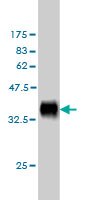ST1703 Sigma-AldrichAnti-DLL1 Mouse mAb (4F8)
Anti-DLL1, mouse monoclonal, clone 4F8, recognizes the DLL1 protein in HeLa cells. It is validated for use in ELISA, Western blotting, and immunocytochemistry.
More>> Anti-DLL1, mouse monoclonal, clone 4F8, recognizes the DLL1 protein in HeLa cells. It is validated for use in ELISA, Western blotting, and immunocytochemistry. Less<<Synonyms: Anti-Delta-like 1
Recommended Products
Overview
| Replacement Information |
|---|
Key Spec Table
| Species Reactivity | Host | Antibody Type |
|---|---|---|
| H | M | Monoclonal Antibody |
| References |
|---|
| Product Information | |
|---|---|
| Form | liquid |
| Formulation | In PBS, pH 7.2. |
| Positive control | HeLa cells |
| Preservative | None |
| Quality Level | MQ100 |
| Physicochemical Information |
|---|
| Dimensions |
|---|
| Materials Information |
|---|
| Toxicological Information |
|---|
| Safety Information according to GHS |
|---|
| Safety Information |
|---|
| Product Usage Statements |
|---|
| Packaging Information |
|---|
| Transport Information |
|---|
| Supplemental Information |
|---|
| Specifications |
|---|
| Global Trade Item Number | |
|---|---|
| Catalogue Number | GTIN |
| ST1703 | 0 |
Documentation
Anti-DLL1 Mouse mAb (4F8) SDS
| Title |
|---|









